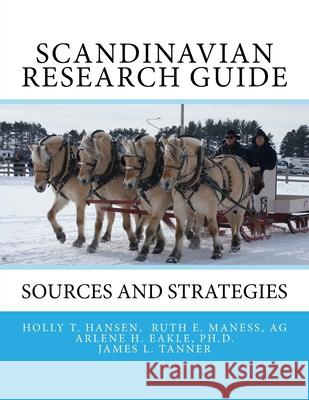Scandinavian Research Guide: Sources and Strategies » książka
Scandinavian Research Guide: Sources and Strategies
ISBN-13: 9781512015461 / Angielski / Miękka / 2015 / 136 str.
This research guide takes you deep into the records, resources, and strategies available for the Nordic countries, more commonly known as Scandinavia. These countries include Denmark, Finland, the Faeroe Islands, Greenland, Iceland, Norway, and Sweden. Finland's language base is totally different from the other Scandinavian countries, but was under Swedish monarchial rule for much of its history. Finland's official records are in the Swedish language from the beginning of record-keeping to about 1867. The following topics are covered: Naming practices: Depending upon your ancestor's country of origin, his or her surname (family name) may lead you to the exact spot in the country where they were born, or leave you amidst a mass of "-sens" or "-ssons." Germanic and Scandinavian Gothic Script: Remember, you learn to read Gothic script by reading it and you learn to read Gothic script by writing it Emigration and Immigration: Scandinavians immigrated to America to improve their circumstances by becoming land owners or mortgagers, to practice freely their learned trades, to participate in the political process, and some came to join family or friends who had emigrated earlier. Effectively using Gazetteers: A gazetteer by definition is a place name index and/or description source. It contains names of small places generally listed in alphabetical order by the language of that country which may be different than here in the US. Learn the details. Scandinavian (Nordic) Church Records: The Lutheran Church was the official recording keeping body of Scandinavia from 1535 into the 1900s. Religious freedom was granted about 1850, but births and deaths of non-Lutherans were still required to be reported. Feast day dates are introduced with some detail. Scandinavian Census Records: Though your ancestors are only represented by a date, a name, a place in a record, you can add a great deal of information to the framework of their lives by finding them in what are generally known as census records. It is important to find your Scandinavian ancestral families in every extant census, for that country, as possible. Census details for each country are covered. Scandinavian Probate Records: The word "Probate" is generally understood to mean the process used to dispose of a deceased person's worldly goods. Sometimes a "will" exists. If not, then a surviving relative such as the wife, eldest son, brother, or other related person, or not, may have applied to become the administrator of the estate. Learn about various and sundry documents that could have been created during the process. Scandinavian Military Records: Background and record types are discussed by country. Printed Sources: All of the Scandinavian countries have other types of records beyond birth, marriage, death, census, or equivalents. Some sources are unique to that country. Others are common to all in a generic sense. Learn about the unique resources by country. Technology and More: Subjects on using catalogs, search engines, brick wall problems and more are also included in this unique research guide to Scandinavian research sources and strategies.
Zawartość książki może nie spełniać oczekiwań – reklamacje nie obejmują treści, która mogła nie być redakcyjnie ani merytorycznie opracowana.











